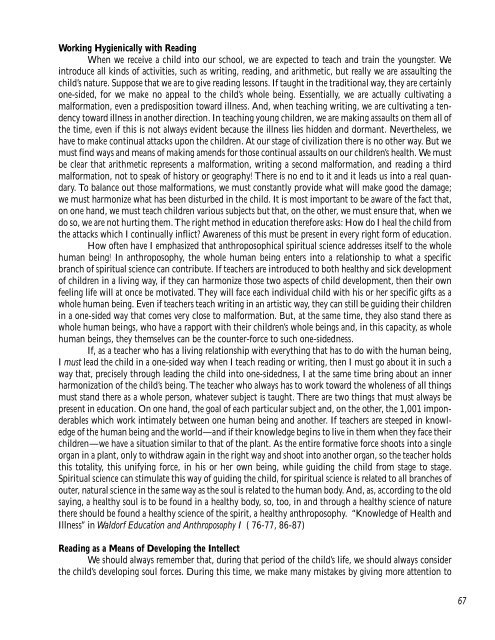Colloquium on English - Research Institute for Waldorf Education
Colloquium on English - Research Institute for Waldorf Education
Colloquium on English - Research Institute for Waldorf Education
Create successful ePaper yourself
Turn your PDF publications into a flip-book with our unique Google optimized e-Paper software.
Working Hygienically with Reading<br />
When we receive a child into our school, we are expected to teach and train the youngster. We<br />
introduce all kinds of activities, such as writing, reading, and arithmetic, but really we are assaulting the<br />
child’s nature. Suppose that we are to give reading less<strong>on</strong>s. If taught in the traditi<strong>on</strong>al way, they are certainly<br />
<strong>on</strong>e-sided, <strong>for</strong> we make no appeal to the child’s whole being. Essentially, we are actually cultivating a<br />
mal<strong>for</strong>mati<strong>on</strong>, even a predispositi<strong>on</strong> toward illness. And, when teaching writing, we are cultivating a tendency<br />
toward illness in another directi<strong>on</strong>. In teaching young children, we are making assaults <strong>on</strong> them all of<br />
the time, even if this is not always evident because the illness lies hidden and dormant. Nevertheless, we<br />
have to make c<strong>on</strong>tinual attacks up<strong>on</strong> the children. At our stage of civilizati<strong>on</strong> there is no other way. But we<br />
must find ways and means of making amends <strong>for</strong> those c<strong>on</strong>tinual assaults <strong>on</strong> our children’s health. We must<br />
be clear that arithmetic represents a mal<strong>for</strong>mati<strong>on</strong>, writing a sec<strong>on</strong>d mal<strong>for</strong>mati<strong>on</strong>, and reading a third<br />
mal<strong>for</strong>mati<strong>on</strong>, not to speak of history or geography! There is no end to it and it leads us into a real quandary.<br />
To balance out those mal<strong>for</strong>mati<strong>on</strong>s, we must c<strong>on</strong>stantly provide what will make good the damage;<br />
we must harm<strong>on</strong>ize what has been disturbed in the child. It is most important to be aware of the fact that,<br />
<strong>on</strong> <strong>on</strong>e hand, we must teach children various subjects but that, <strong>on</strong> the other, we must ensure that, when we<br />
do so, we are not hurting them. The right method in educati<strong>on</strong> there<strong>for</strong>e asks: How do I heal the child from<br />
the attacks which I c<strong>on</strong>tinually inflict? Awareness of this must be present in every right <strong>for</strong>m of educati<strong>on</strong>.<br />
How often have I emphasized that anthroposophical spiritual science addresses itself to the whole<br />
human being! In anthroposophy, the whole human being enters into a relati<strong>on</strong>ship to what a specific<br />
branch of spiritual science can c<strong>on</strong>tribute. If teachers are introduced to both healthy and sick development<br />
of children in a living way, if they can harm<strong>on</strong>ize those two aspects of child development, then their own<br />
feeling life will at <strong>on</strong>ce be motivated. They will face each individual child with his or her specific gifts as a<br />
whole human being. Even if teachers teach writing in an artistic way, they can still be guiding their children<br />
in a <strong>on</strong>e-sided way that comes very close to mal<strong>for</strong>mati<strong>on</strong>. But, at the same time, they also stand there as<br />
whole human beings, who have a rapport with their children’s whole beings and, in this capacity, as whole<br />
human beings, they themselves can be the counter-<strong>for</strong>ce to such <strong>on</strong>e-sidedness.<br />
If, as a teacher who has a living relati<strong>on</strong>ship with everything that has to do with the human being,<br />
I must lead the child in a <strong>on</strong>e-sided way when I teach reading or writing, then I must go about it in such a<br />
way that, precisely through leading the child into <strong>on</strong>e-sidedness, I at the same time bring about an inner<br />
harm<strong>on</strong>izati<strong>on</strong> of the child’s being. The teacher who always has to work toward the wholeness of all things<br />
must stand there as a whole pers<strong>on</strong>, whatever subject is taught. There are two things that must always be<br />
present in educati<strong>on</strong>. On <strong>on</strong>e hand, the goal of each particular subject and, <strong>on</strong> the other, the 1,001 imp<strong>on</strong>derables<br />
which work intimately between <strong>on</strong>e human being and another. If teachers are steeped in knowledge<br />
of the human being and the world—and if their knowledge begins to live in them when they face their<br />
children—we have a situati<strong>on</strong> similar to that of the plant. As the entire <strong>for</strong>mative <strong>for</strong>ce shoots into a single<br />
organ in a plant, <strong>on</strong>ly to withdraw again in the right way and shoot into another organ, so the teacher holds<br />
this totality, this unifying <strong>for</strong>ce, in his or her own being, while guiding the child from stage to stage.<br />
Spiritual science can stimulate this way of guiding the child, <strong>for</strong> spiritual science is related to all branches of<br />
outer, natural science in the same way as the soul is related to the human body. And, as, according to the old<br />
saying, a healthy soul is to be found in a healthy body, so, too, in and through a healthy science of nature<br />
there should be found a healthy science of the spirit, a healthy anthroposophy. “Knowledge of Health and<br />
Illness” in <strong>Waldorf</strong> Educati<strong>on</strong> and Anthroposophy I ( 76-77, 86-87)<br />
Reading as a Means of Developing the Intellect<br />
We should always remember that, during that period of the child’s life, we should always c<strong>on</strong>sider<br />
the child’s developing soul <strong>for</strong>ces. During this time, we make many mistakes by giving more attenti<strong>on</strong> to<br />
67

















